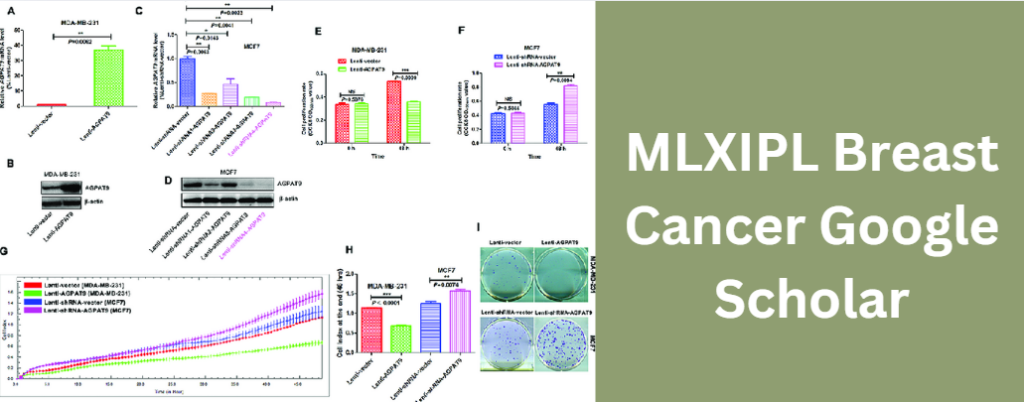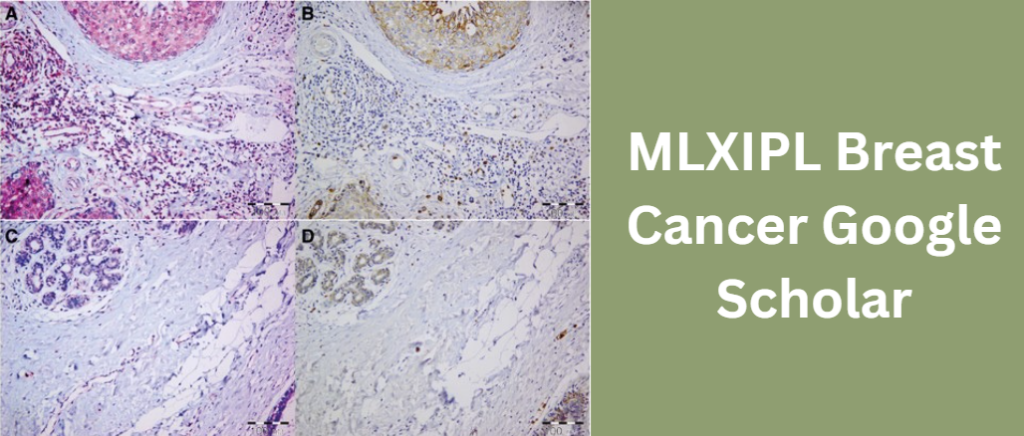The exploration of breast cancer biology has led to significant breakthroughs, particularly in understanding the role of transcription factors like MLXIPL (ChREBP). MLXIPL plays a vital role in metabolic regulation, which cancer cells often manipulate to support their growth and survival.
By using platforms like Google Scholar, researchers can access a wealth of studies focusing on the intersection of MLXIPL and breast cancer, deepening our understanding and advancing potential treatments.
This article sheds light on the topic with a focus on academic insights into “MLXIPL breast cancer Google Scholar.”
What is MLXIPL and Why Does it Matter in Breast Cancer?

Understanding MLXIPL
MLXIPL, or Carbohydrate Response Element Binding Protein, regulates glucose and lipid metabolism. While it is essential for normal cellular processes, cancer cells leverage its functions to thrive under metabolic stress. Research available on Google Scholar highlights how MLXIPL contributes to metabolic reprogramming, a hallmark of breast cancer.
MLXIPL in Breast Cancer Biology
Cancer cells undergo significant metabolic changes to meet their energy demands. MLXIPL is central to these changes, facilitating glycolysis and lipid biosynthesis. By reviewing articles on Google Scholar, researchers have uncovered how MLXIPL promotes tumor growth, particularly in aggressive breast cancer subtypes.
Insights from MLXIPL Breast Cancer Google Scholar Studies

MLXIPL’s Role in Metabolic Reprogramming
Breast cancer cells heavily rely on metabolic flexibility. MLXIPL regulates genes that enable this adaptation, ensuring continuous energy production even under nutrient-limiting conditions. Scholarly articles on Google Scholar discuss its critical involvement in upregulating enzymes necessary for glycolysis and lipid synthesis.
Clinical Correlation of MLXIPL Expression
Studies accessed through Google Scholar reveal a direct correlation between elevated MLXIPL levels and poor clinical outcomes in breast cancer patients. This makes it a potential biomarker for aggressive breast cancer phenotypes.
MLXIPL and Therapeutic Resistance
High MLXIPL activity has been associated with resistance to certain breast cancer treatments. Articles indexed on Google Scholar indicate that targeting MLXIPL could enhance the efficacy of existing therapies by disrupting cancer cell metabolism.
Therapeutic Potential of Targeting MLXIPL in Breast Cancer

MLXIPL as a Drug Target
The strategic inhibition of MLXIPL could disrupt cancer cell metabolism, starving tumors of the resources they need to grow. Insights from Google Scholar suggest that small molecules targeting MLXIPL pathways are showing promise in preclinical studies.
Combination Therapies
Combining MLXIPL inhibitors with traditional chemotherapies may yield synergistic effects. Research available on Google Scholar emphasizes the potential for this approach to overcome metabolic adaptations in cancer cells.
Challenges in MLXIPL Breast Cancer Research

Complexity of Breast Cancer Subtypes
Breast cancer is highly heterogeneous, making it challenging to develop universal MLXIPL-targeted treatments. Scholars on Google Scholar advocate for personalized medicine approaches to overcome this hurdle.
Side Effects of Targeting MLXIPL
Since MLXIPL is vital for normal metabolic functions, precision targeting is crucial to minimize harm to healthy cells. Advanced research documented on Google Scholar focuses on improving drug specificity to address this issue.
Future Directions for MLXIPL Breast Cancer Research

Expanding Research Networks
Platforms like Google Scholar enable researchers worldwide to collaborate and share findings. By pooling resources and data, scientists aim to accelerate progress in understanding MLXIPL’s role in breast cancer.
Integrating Genomic and AI Technologies
The integration of genomic studies with AI is helping researchers identify patterns in MLXIPL expression linked to breast cancer progression. Scholarly works on Google Scholar underscore the importance of these technologies in advancing personalized medicine.
FAQs on MLXIPL Breast Cancer Google Scholar
Q: What does MLXIPL do in breast cancer?
MLXIPL regulates metabolic pathways that breast cancer cells exploit to support their growth and survival. Research indexed on Google Scholar highlights its involvement in glycolysis and lipid biosynthesis.
Q: How can MLXIPL be targeted in breast cancer treatment?
Therapies targeting MLXIPL aim to disrupt cancer metabolism, potentially enhancing the effects of chemotherapy and immunotherapy. Studies found on Google Scholar detail promising preclinical trials.
Q: Why is MLXIPL important in academic research?
MLXIPL is central to metabolic reprogramming, a hallmark of cancer. Scholars on Google Scholar emphasize its role as both a biomarker and a therapeutic target for aggressive breast cancer.
Q: Are there ongoing clinical trials for MLXIPL inhibitors?
Yes, several preclinical and early-phase clinical trials are exploring MLXIPL-targeted therapies. Google Scholar articles provide insights into these developments.
Conclusion
The keyword “MLXIPL breast cancer Google Scholar” captures the essence of a rapidly advancing field in cancer research. MLXIPL’s role in breast cancer metabolism, as explored in countless studies on Google Scholar, presents both challenges and opportunities for therapy development.
With continued research and collaboration, targeting MLXIPL could lead to breakthroughs in breast cancer treatment and improve outcomes for patients worldwide.
Affiliated Posts Like MLXIPL Breast Cancer Google Scholar
Fixing the Fallout New Vegas NVR Male Skin Distorted Issue
Simon Miller Halabalee Shirt – A Bold and Stylish Wardrobe Staple
Astrix Technology Group 513-370-2525: Leading Digital Transformation and Scientific Staffing
